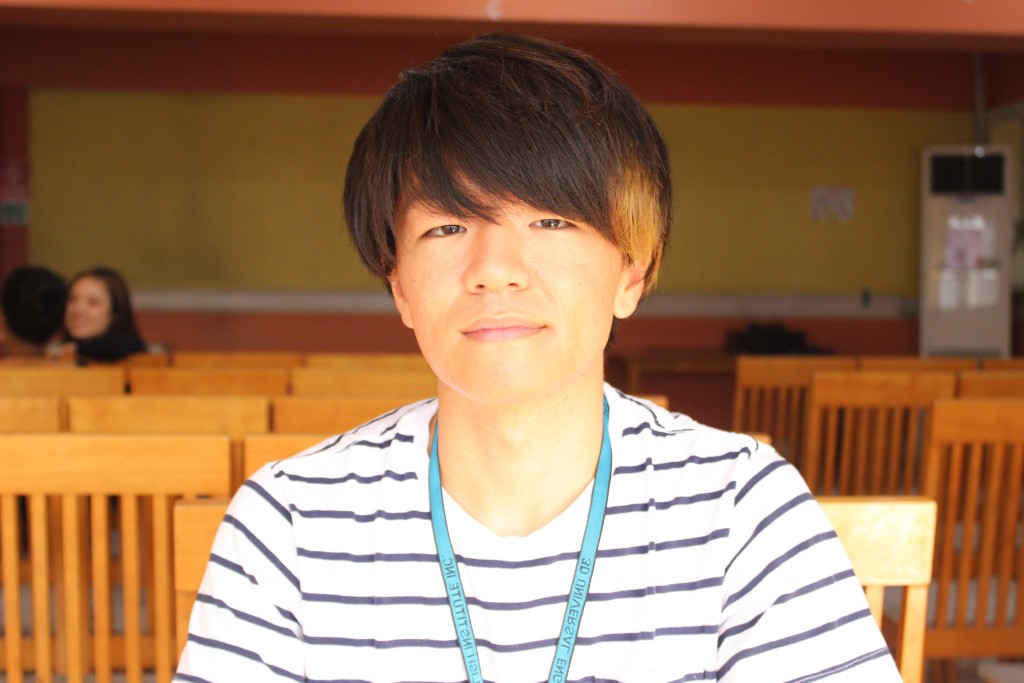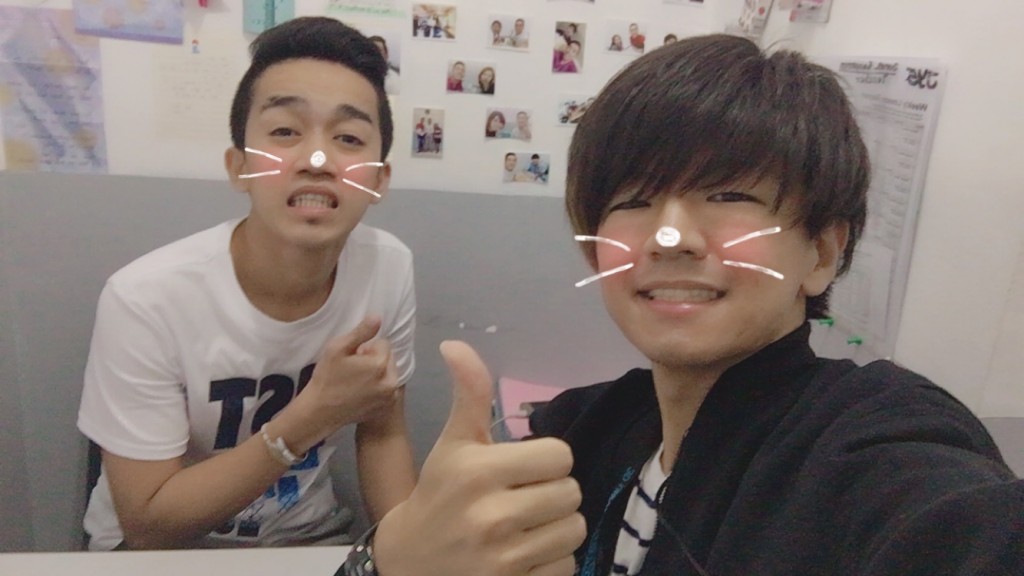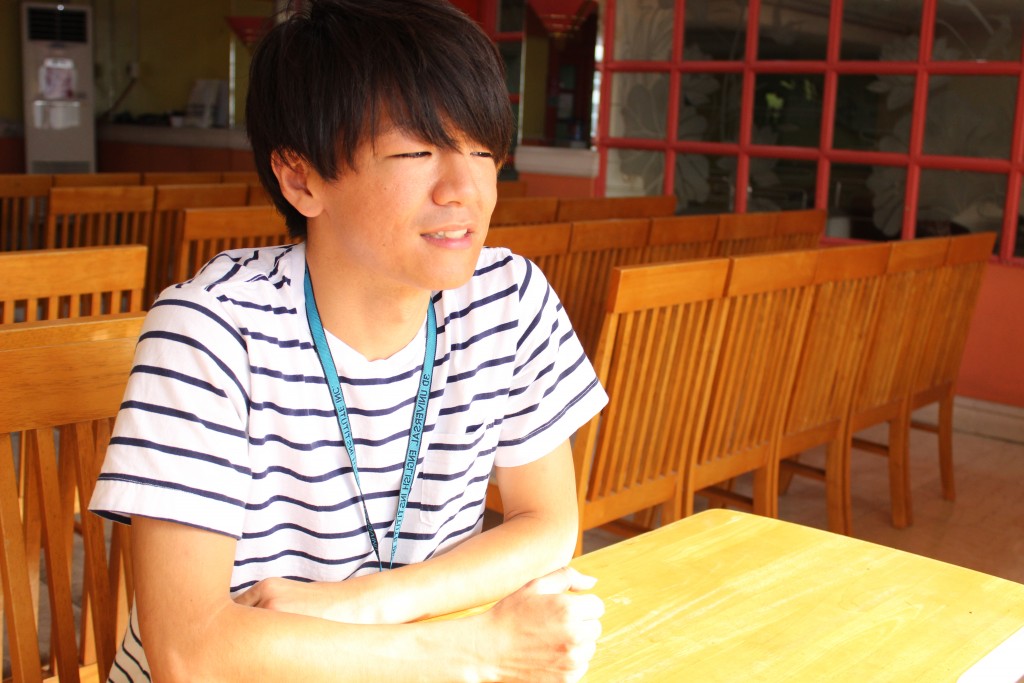Chasing a Dream: Natsu’s 4-Week English Study Abroad Experience in Cebu


Contents
- Chasing a Dream: Natsu’s 4-Week English Study Abroad Experience in Cebu
- Chapter 1: Learning English to Achieve a Dream — Why Natsu Chose to Study Abroad
- Chapter 2: Making Study Abroad Possible on His Own Budget — 3 Reasons Why Natsu Chose 3D ACADEMY
- Chapter 3: Four Weeks Immersed in English — Growth Through the ESL Course
- Chapter 4: Practicing “Usable English” Beyond the Classroom — Building a Habit of Speaking Daily
- Chapter 5: Deep Lessons from Memorable Teachers — Learning to Speak with Confidence and Purpose
- Chapter 6: For Future Students — Why Even Beginners Can Feel Confident Studying Abroad
- Chapter 7: The Next Step Toward His Dream — Studying in Canada and Aiming for a High TOEIC Score
- Chapter 8: Afterword — How a “Purpose-Driven” Study Abroad Experience Leads to Real Growth
Chasing a Dream: Natsu’s 4-Week English Study Abroad Experience in Cebu
Combining His Love for Cafés and Vintage Fashion
“I study English because I want to make my dream come true.”
That’s what Natsu, a university student majoring in English and American literature, told us.
He has a clear vision: to one day open his own shop that blends his love for cafés and vintage fashion, sourcing unique items from overseas. And as a first step toward that dream, he decided to study English abroad in Cebu, Philippines.
In this article, we’ll share Natsu’s personal journey—why he chose to study abroad, what kind of classes he took, and how the experience changed him.
Despite feeling nervous about living abroad for the first time, Natsu saved up the money on his own and took the leap. The four weeks he spent at 3D ACADEMY weren’t just about improving his English—they helped him gain confidence and move one step closer to his dream.
If you’re currently thinking about studying abroad or looking for motivation to learn English, we hope Natsu’s story will inspire you to take your next step forward.

Chapter 1: Learning English to Achieve a Dream — Why Natsu Chose to Study Abroad
“One day, I want to open a shop that combines my love for cafés and vintage clothing.”
To make that dream a reality, Natsu realized he needed one essential skill: English.
Currently a second-year university student in the Kansai region of Japan, Natsu is majoring in English and American literature. At school, he reads literary works in English and writes analytical essays, gaining exposure to academic English on a daily basis. However, he began to feel that what he was learning in the classroom wasn’t quite enough.
“If I’m going to buy clothes overseas or interact with international customers in the future, I need to be able to actually speak English.”
Natsu’s interest in English was sparked during a school trip in his second year of high school. He spent five days in Singapore and Malaysia, where he had the chance not only to sightsee but also to interact with local high school students. The experience of communicating with people from different cultures in English left a lasting impression on him.
“That was the first time I thought, ‘It would be so much more fun if I could really speak English.’ Once you can communicate, other cultures and people feel much closer. After that, I started to take my English classes more seriously.”
At university, Natsu also joined a fashion circle where he enjoyed taking street-style photos and creating pamphlets. As he continued to explore his interests, the desire to turn his passion into a career became stronger.
“I want to work surrounded by the things I love. If that means running my own shop, then I need the ability to connect with the world—and that means learning English.”
With that in mind, Natsu started saving money from part-time jobs and made the decision to spend his long vacation on an English study abroad program.
This was his first serious step toward investing in his future—and he chose Cebu as the starting point.

Chapter 2: Making Study Abroad Possible on His Own Budget — 3 Reasons Why Natsu Chose 3D ACADEMY
Wanting to improve his English to pursue his dream is one thing—but for a university student, cost can be the biggest hurdle.
For Natsu, affordability was a key factor when choosing where to study abroad.
His first step was to visit the international office at his university. There, he had access to records and reports from past exchange students, many of whom had studied in major English-speaking countries like the U.S. and Australia. But what really caught his eye were the price tags—some students had spent over 1 million yen (around $6,500 USD) for just one month.
“One of the students who went to the U.S. said it cost around 1.5 million yen for a month, including living expenses. I knew I wanted to fund the trip myself through part-time jobs, so that just wasn’t realistic for me.”
That’s when Natsu turned his attention to studying in the Philippines.
While still an English-speaking environment, the costs were only a third to half of those in Western countries. And on top of that, the Philippines offered one-on-one lessons as a standard, which appealed to him as a more effective way to learn.
Then, by chance, a friend introduced him to 3D ACADEMY—his friend’s senior had actually graduated from the school. Hearing firsthand that the school had a great location, comfortable living conditions, and excellent cost performance made Natsu even more interested.
In the end, he chose 3D ACADEMY for three main reasons:
1. Affordable Even When Self-Funded
Compared to studying in the U.S. or Canada, 3D ACADEMY offered one-on-one lessons at a fraction of the cost. Even with just a one-month stay, the structure allowed for noticeable progress—making it a smart investment.
2. Supportive Environment for Beginners
As someone who didn’t consider himself fluent in English, Natsu wanted a school where he wouldn’t feel left behind.
Thanks to advice from a former student, he learned that 3D ACADEMY’s teachers were kind and patient, and that the overall support system made living and learning easier, easing his initial worries.
3. Great Location and Daily Convenience
The fact that a supermarket was located right below the school provided peace of mind, especially for someone experiencing their first long-term stay abroad.
Once there, he found daily life surprisingly smooth and easy, with no major hurdles in settling in.
“To actually become a good English speaker, I knew I needed real opportunities to speak. But that’s hard to find in Japan. That’s why I wanted a place where I could immerse myself, even if only for a short time.”
By weighing his dreams against the practicalities, Natsu found that 3D ACADEMY struck the perfect balance—cost-efficiency, learning environment, and peace of mind—making it the ideal place to take his next step.
Chapter 3: Four Weeks Immersed in English — Growth Through the ESL Course
Natsu enrolled in the ESL (English as a Second Language) course, designed to comprehensively develop general English skills. This course caters to a wide range of levels, from beginners to intermediate learners, and is ideal for those who want to improve their ability to speak English.
His study abroad program lasted four weeks—a relatively short stay for a first-time language learner.
Still, it was an incredibly intensive and meaningful experience filled with learning and self-discovery.
“To be honest, one month wasn’t enough.”
That’s the first thing Natsu said during the interview.
“It went by so fast. Just when I started to feel comfortable with English, it was already time to go home. If I could, I would have stayed for two or three months.”
Even so, he says the progress he made in just four weeks was real and rewarding.
From “Words Won’t Come Out” to “I Can Speak Naturally”
Although Natsu had some experience with writing essays in English at university, he had very little speaking practice.
In Japan, he rarely had chances to actually use English in conversation.
“During the first class, I couldn’t even say basic words like apple or play. It was honestly a shock.”
But as the days went by, he gradually got used to putting thoughts into words.
“Now, I can express myself more naturally in simple conversations. That’s a big improvement for me.”
Focused on Speaking — One-on-One Lessons Every Day
The ESL course at 3D ACADEMY offers up to four one-on-one lessons per day, combined with two to three group classes.
Because Natsu’s top priority was to improve his speaking skills, he devoted nearly all of his one-on-one sessions to conversation practice. He also took vocabulary and idiom classes to expand the range of expressions he could use.
Group Classes: Movies, Pronunciation, and Beginner-Friendly Options
In the group classes, Natsu explored various areas that matched his interests and skill level.
These included a beginner English class, a pronunciation class, and a movie-based class.
“In the movie class, I learned a lot about the natural rhythm of English and real native expressions. The pronunciation class also helped me become more aware of how I speak in everyday conversations.”
“Even in Four Weeks, I Felt Real Change in Myself”
What made the biggest difference was the intensive speaking practice Natsu was able to do, even within a limited time.
“Becoming fluent takes time. But I realized that just allowing myself to try, and not being afraid to make mistakes, made a huge difference. That mindset shift alone was worth it.”
Back home in Japan, it’s hard to find a space where you’re constantly encouraged to speak.
But during his time in Cebu, Natsu was able to experience what it means to “live through English.”
It wasn’t just about learning the language—it was about using English as a real tool for communication, connection, and personal growth.
Chapter 4: Practicing “Usable English” Beyond the Classroom — Building a Habit of Speaking Daily
“You don’t learn English only inside the classroom.”
That’s what Natsu said when reflecting on his study abroad experience.
For him, it wasn’t just about attending classes—he turned his entire daily life into an English training ground.
Creating Opportunities to Speak
Since he studied abroad during the summer, there were many other Japanese students on campus, and naturally, conversations in Japanese tended to increase.
But Natsu made a conscious effort to create opportunities to speak English throughout the day.
“Even during short breaks between classes, I tried to chat with my teachers.
Even casual small talk was a great chance to apply what I had just learned—and it helped me remember new expressions much more easily.”
He also used English while out and about after school, whether it was ordering food at a restaurant, talking to shop staff at the mall, or asking locals for directions.
All these small actions became practical training sessions in real life.
“At first, I made a lot of mistakes, and it was embarrassing. But after a few tries, the happiness of being understood outweighed the fear.
Once you experience success even once, you want to try again.”
From “Learning” to “Using” — When English Becomes a Living Language
This habit of using English outside class turned out to be the perfect complement to what he learned in his one-on-one lessons.
For example, if he learned a new phrase in the morning, he’d immediately try it out in conversation that afternoon.
“When you use it in real life, the phrase becomes your own—it starts coming out naturally.”
He also realized something deeper:
“There’s a huge gap between knowing English and actually using it. But the more chances you have to speak, the smaller that gap becomes.
That’s something you can’t really experience in Japan.”
You Can Create an English Environment—Even If Surrounded by Japanese
Some people worry that they won’t have many chances to speak English if there are too many Japanese students around.
But Natsu took a more proactive perspective:
“In the end, it’s up to you. You can choose who you talk to, and in what language.
Even with Japanese friends, you can have ‘English-only days.’ That alone becomes great practice.”
To make the most of a short-term study abroad experience, Natsu followed a simple but powerful cycle:
Learn in class → Use it in real life → Review it the next day.
Repeating this cycle for four straight weeks turned his English from something academic into something truly usable—a skill he could rely on.

Chapter 5: Deep Lessons from Memorable Teachers — Learning to Speak with Confidence and Purpose
The greatest value of studying abroad may not lie in vocabulary lists or grammar rules.
It may come from the powerful experience of having a genuine conversation in English—sharing your thoughts and feelings with someone in another language.
For Natsu, two teachers left a particularly lasting impression. Their classes didn’t just improve his English—they helped shape his way of thinking and gave him the courage to express himself.
One-on-One Discussions with Teacher May — Tackling Social Issues in English
“Back in Japan, I never had the chance to express my opinions in English.”
That’s how Natsu described his initial nerves when he started his one-on-one lessons with Teacher May.
Her classes involved not only learning expressions and vocabulary, but also discussing social issues—giving Natsu the chance to practice putting his personal views into English words.
“At first, it took me a long time to organize my thoughts, and I couldn’t express myself well. But she always waited patiently and supported me. Gradually, I was able to speak up more confidently.”
May often told him, “I want to hear your opinion.”
That simple phrase gave him the motivation to keep trying.
By the end of his one-month stay, he could explain his stance on complex topics in English.
Through this experience, Natsu came to see English not just as a subject to study, but as a tool to express his ideas—a means of communication with real impact.
Group Classes with Teacher Jim — Learning to Think through “Why?”
The second teacher who left a strong impression was Teacher Jim, who led beginner-level group classes.
These classes revolved around everyday topics, where students would share their thoughts in English.
But every time Natsu gave an answer, Jim would respond with a simple but powerful question: “Why?”
“At first, I was confused. I thought I had given a complete answer. But when Jim kept asking ‘Why?’, I realized I needed to go deeper—to explain the reasoning behind my thoughts.”
This repetition taught Natsu to build a habit: state your opinion → consider your reasons → explain them clearly.
It not only strengthened his English, but also improved his logical thinking.
“That kind of thinking skill will be useful not just for English, but in any situation in the future.”
The repeated interactions with these teachers gave Natsu something invaluable: confidence.
He doesn’t describe his growth as simply “becoming fluent.”
Instead, he says he became someone who’s no longer afraid to speak—someone who can express ideas, even imperfectly, with sincerity and purpose.
“What matters more than perfect grammar is putting your heart into what you say.
I’m really grateful to my teachers for helping me realize that.”
In the end, the greatest gift of his study abroad experience was this sense of joy—the joy of being able to communicate and connect with others through English.
Chapter 6: For Future Students — Why Even Beginners Can Feel Confident Studying Abroad
“Can I really keep up with the classes if I can’t speak English?”
That was one of Natsu’s biggest concerns before going abroad.
But after completing his four-week study abroad program, he now says with full confidence:
“Even beginners don’t need to worry!”
More Important Than Skill Is the Willingness to Speak
At 3D ACADEMY, there are many students just like Natsu—beginners who come with limited English skills.
Classes are divided by level, so everyone can start from a place that matches their ability. That’s why Natsu rarely felt lost or overwhelmed.
“Even when I didn’t understand something, the teachers would explain it using simpler phrases or even gestures.
Honestly, I think the courage to say ‘I don’t understand’ is more important than knowing everything from the start.”
One thing he learned during his stay: your attitude—especially not being afraid to make mistakes—has a huge impact on how fast you grow.
Friendly Teachers Create a Safe, Supportive Space
One of the biggest strengths of 3D ACADEMY is its warm, welcoming atmosphere created by the teachers.
“Every morning, the teachers greeted me with a big smile and a cheerful ‘Good morning!’ It helped me relax from day one.”
With one-on-one classes, students get the time and space to speak at their own pace.
“Even when I got stuck trying to say something, the teachers never rushed me. They just waited and listened.
It really made me feel comfortable speaking, even when I wasn’t confident.”
Custom Vocabulary App Helped Him Study Effectively
To support his learning outside the classroom, Natsu created his own vocabulary flashcard app.
Whenever a new word or phrase came up in class, he would jot it down and immediately add it to the app.
He used it during his commute, before meals, and during breaks to review and reinforce what he had learned.
“It’s so easy to check words on your phone. Reviewing became a natural habit.
It felt like having a personalized dictionary right in my pocket.”
“If You’re Unsure—Just Take the Leap”
As a final message to others considering studying abroad, Natsu offered this advice:
“Even if you’re not confident in your English, if you truly want to speak it, then it’s absolutely worth taking the leap.
Once you’re here, you’ll be in an environment where you have to use English—and that pushes you to grow faster than you’d expect.”
In the end, studying abroad isn’t just about improving your language skills.
It’s about gaining something even more powerful: the confidence that you can do it.
That may be the most valuable lesson of all.
Chapter 7: The Next Step Toward His Dream — Studying in Canada and Aiming for a High TOEIC Score
After completing his four-week study abroad program in Cebu, a new desire began to grow within Natsu:
“I want to study for a longer period, and in a more advanced environment.”
His next goal? Studying in Canada.
To prepare for that, he has already begun seriously working toward a higher TOEIC score.
Discovering “What’s Next” After Cebu
“To be honest, at first I just wanted to improve my English skills. But during my time in Cebu, I discovered how fun it is to express my thoughts in English.
That made me want to go deeper—to really master the language.”
The Cebu experience clarified both his strengths and the areas he still needed to work on.
With that awareness came a new challenge: taking his studies to the next level in a more immersive environment—a long-term language program in Canada.
A High TOEIC Score as the Key to Studying Abroad
At Natsu’s university, students who achieve high TOEIC scores are eligible for scholarships or financial support for overseas study.
So since returning to Japan, Natsu has continued to study hard with TOEIC as his focus.
“My speaking improved a lot during the study abroad program. Now I’m focusing more on listening, reading, and test-taking skills.
I want to turn English into a real strength that opens up new opportunities for me.”
His Dream: A Café Meets Vintage Clothing — Connecting With the World Through English
Natsu isn’t learning English just for the sake of speaking it.
At the core of his motivation is a clear, unchanging dream.
That dream is to open a one-of-a-kind shop that combines his love for cafés and vintage fashion.
He’s a true café enthusiast—he even enjoys going on long weekend drives just to find the perfect cup of coffee. And when it comes to vintage clothing, he’s passionate about style and wants to personally source items from around the world.
“If I can speak English, I can travel the world and hand-pick pieces that I truly believe in.
I’d love to create a space where even one person’s day could be made a little brighter.”
More Than Just Language Skills — Gaining the Courage to Take Action
For Natsu, learning English is simply a tool to pursue his dream.
But the four weeks he spent sharpening that tool in Cebu turned out to be a life-changing experience.
“Studying abroad gave me this feeling of, ‘If I try, I can do it.’
That confidence is what’s now helping me take the next step forward.”

Chapter 8: Afterword — How a “Purpose-Driven” Study Abroad Experience Leads to Real Growth
After completing his short but impactful four-week study abroad experience in Cebu,
Natsu repeatedly shared one clear message during the interview:
“I want to learn more. I want to speak more.”
At the core of that desire wasn’t just a love for English itself,
but rather a clear purpose — learning English as a tool to achieve his dream.
A Goal Gives Meaning to Every Action
At 3D ACADEMY, many students arrive with a clear purpose, just like Natsu.
And what they all seem to have in common is this: their study abroad experience becomes richer, deeper, and more fulfilling.
“I want to open a café that also sells vintage clothing.”
What might sound like a fashion dream at first becomes, with language skills and global perspective, a realistic and exciting business that connects with the world.
When you have a goal, every hour in class becomes “preparation for your future.”
Every new word you memorize becomes “one step closer to your dream.”
This sense of purpose deepens the learning process and naturally accelerates growth.
Study Abroad Isn’t the Goal — It’s the Starting Point
Natsu’s story teaches us something important:
Studying abroad isn’t the finish line. It’s the launchpad toward your dream.
Of course, you don’t need to have a perfect plan before you go abroad.
But even just asking yourself questions like,
“Why do I want to learn English?”
“How do I want to use it?”
can bring greater clarity and meaning to your journey.
Bring Tomorrow’s Dream Closer with Today’s Action
You might be unsure. You might think, “I’m not confident enough” or “Maybe this isn’t for me.”
Natsu felt the same way before coming to Cebu.
But now, he’s boldly setting his sights on the next challenge:
“I want to study in Canada.”
What matters most is having the courage to take that first step.
Because just like Natsu, one small step could change your future.
And at 3D ACADEMY, you’ll find a place full of possibilities—
a place where your journey can truly begin.




